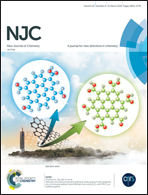Facile one-pot nanocatalysts encapsulation of palladium–NHC complexes for aqueous Suzuki–Miyaura couplings†
Abstract
Organic transformations using water as the solvent have been the focus of intense investigation. We herein present a strategy that uses simple nanoparticle encapsulation to fabricate water-soluble nanocatalysts (NCs) for aqueous cross-coupling reactions. To achieve this goal, three types of N-heterocyclic carbene (NHC)–palladium (Pd) complexes (i.e., 1b, 2b, and 3b) with the chemical formula [PdL(CH3CN)Cl]PF6 (where L is a bidentate pyridine- or pyrimidine-bearing NHC ligand) have been synthesized, and their structures were characterized by NMR spectroscopy and X-ray crystallography. Exploiting a facile one-pot encapsulation process, the water-insoluble Pd–NHC complexes can be integrated into the hydrophobic cores of micelles composed of an amphiphilic copolymer. These water-dispersed nanoparticles exhibited excellent catalytic activity in aqueous Suzuki–Miyaura couplings. Among these NCs, 3b-NC, bearing a mesityl moiety on its NHC ligand, was found to be the most active catalyst under the tested reaction conditions. More impressively, 3b-NC can be reused for at least five cycles without substantial loss of catalytic activity.



 Please wait while we load your content...
Please wait while we load your content...